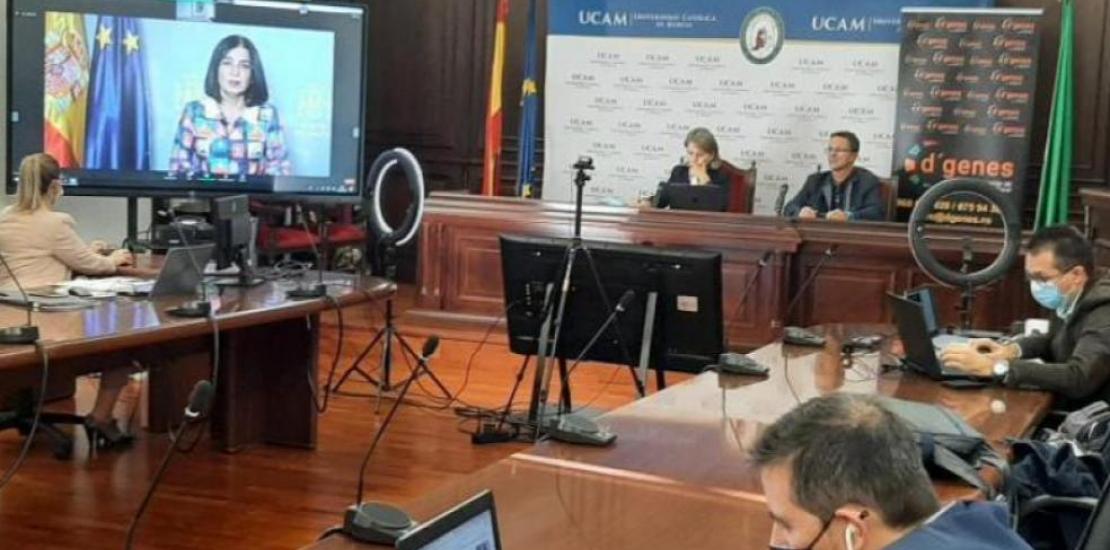Nearly 800 professionals, affected patients and relatives come together at the International Congress on Rare Diseases
The event, organised by D'Genes and UCAM, will be followed online as of today and until Friday by more than 20 countries, especially countries from Latin America. Carolina Darias, Minister of Health, has spoken at the inauguration of the event.
More than one hundred thousand people in the Region of Murcia and three million in Spain suffer from a rare disease. The key to fighting these diseases, through rapid diagnosis and access to treatment, is to share knowledge, as reflected in the slogan chosen for the 14th edition of the International Conference on Rare Diseases, 'Sharing knowledge, training people'. Organised by the association D'Genes and the Universidad Católica de Murcia, nearly 800 people from 20 countries, especially from Latin America, took part in the online event. More than fifty speakers from the different fields involved participated in the event, analysing advances in diagnosis, the use of gene therapy, access to orphan drugs as a challenge for the future, the humanisation of these diseases and the important role of associations.
Juan Carrión, president of D'Genes, FEDER and ALIBER; Estrella Núñez, vice-rector of Research at UCAM - who spoke on site from the Chapter House of the Campus de Los Jerónimos -; Carolina Darias, Minister of Health; and Juan José Pedreño, Regional Councillor of Health for the Region of Murcia, all virtually took part in the inauguration of the congress.
Juan Carrión emphasised that this informative event "brings together all the different stakeholders involved", patients and their relatives, associations, public administration, researchers, pharmacists, etc. "with the aim of sharing knowledge and establishing contacts, since the main problem of rare diseases is the lack of knowledge regarding said diseases". He also stressed the need to treat these patients "through comprehensive care", defending their rights in order to be diagnosed in the shortest possible time, and to have access to treatment.
Scientific advances are key in this area, as the UCAM Vice-Rector for Research, Estrella Núñez, highlighted, pointing out that this university is strongly committed to research in the field of Health Sciences: "We have made a great commitment to society, which means that we work tirelessly. Many of UCAM's projects are linked to the area of health, some of them on the frontiers of knowledge and focused on this type of diseases, such as those we are carrying out with Dr. Juan Carlos Izpisúa, Professor of Developmental Biology and researcher at the Salk Institute in California".
The Minister of Health said that "we have come a long way in the field of rare diseases, but we still have a long way to go to continue giving hope to those who are affected by them as well as to their families. I would like to acknowledge the work done by researchers and healthcare professionals, and that of associations such as D'Genes, which comprises the affected, their families as well as professionals from different fields". She explained that "since 2013, we have been investing funds to implement strategic actions, such as the importance of having a register of rare diseases which allows us to know the incidence of these ailments throughout the territory, and of which we will soon publish the 2021 report".
Juan José Pedreño, Regional Councillor of Health, recalled that "the Region of Murcia was the first autonomous community in our country to implement a circuit that connects all primary care doctors and paediatricians with the Medical Genetics section, a regional coordinating unit of reference in rare diseases".
"Get up, smile and keep moving forward"
Teresa Navarro, Valencia City Council's Ombudsperson for People with Disabilities, and María del Mar López, both mothers of children with rare diseases, opened the congress with their testimonies. Teresa Navarro reiterated her motto 'Stand up, smile and move forward', showing the image of her son; she called for more investment in research "because without it, there is no future", and greater coordination between professionals, "because these diseases require multidisciplinary care". Meanwhile, María del Mar López called on institutions to invest resources in educational centres as well.




